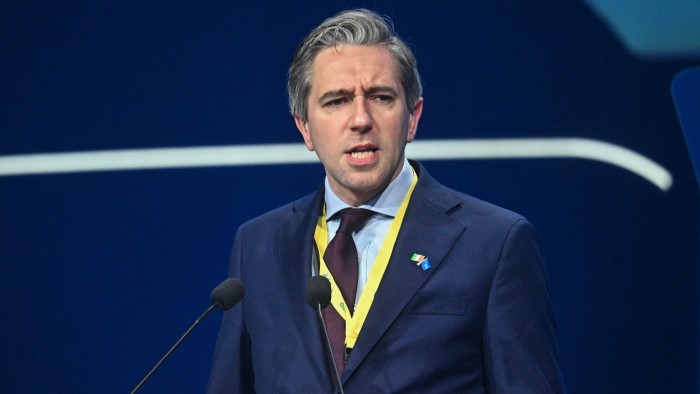Unlock the Editor’s Digest for free
Roula Khalaf, Editor of the FT, selects her favourite stories in this weekly newsletter.
Ireland’s government will this week present plans to ban trade in goods with Israeli businesses in occupied Palestinian territories, becoming the first EU country to take such a step.
Simon Harris, foreign and trade minister, said the planned legislation came in response to an escalation in what he called the country’s “war crimes” in Gaza.
Harris will on Tuesday launch the process of drafting legislation, days after a majority of EU states voted to review the bloc’s trade deal with Israel. The move comes amid legal debate over whether trade in services such as Airbnb can be included in the bill.
“It is clear war crimes are taking place, children are being starved and food is being used as a weapon of war,” Harris told the Financial Times. “The world has not done enough and we need to act.”
Ireland’s goods imports from Israeli businesses in the occupied territories of the West Bank and East Jerusalem are tiny. But the Dublin government, which last year recognised the state of Palestine together with Spain and Norway, wants European countries to follow its lead.
“There has never been a targeted trade measure of this nature before at an EU level,” said Conor O’Neill, head of policy and advocacy at Christian Aid Ireland, who co-drafted a previous occupied territories bill in 2018, sponsored by an independent senator.

“The key thing is whether the government will deliver a full ban on all trade with the illegal settlements, both in physical goods like dates and oranges, but also intangible services like tourism and IT.”
Palestinian-made goods from the West Bank and East Jerusalem, such as Zaytoun olive oil, would be exempt.
More than 400 Irish academics and lawyers said in an open letter last week that there were “no insurmountable obstacles in Irish, EU or international law” to including services, saying that to do so would honour an advisory opinion last year by the International Court of Justice. The letter echoed another opinion by experts on EU law.
Such a move could block Airbnb from listing rentals in the territories because the US company has its European headquarters in Dublin, making it subject to Irish law, O’Neill said.
Airbnb declined to comment. In 2019, it reversed course on plans to delist properties in the occupied territories after settling lawsuits, and said it would donate profits from those listings to aid agencies.
The Irish government for years blocked the 2018 bill amid fears that it would contravene EU trade rules. But Harris said: “Given the scale and gravity of what we’re now seeing with the deprivation of aid and the bombardment of Gaza . . . this is an appropriate course of action to take.”
He said last week he had “no policy disagreement . . . whatsoever” with including services in the bill, but had been advised it was legally impossible.
The European Commission declined to comment. In their letter, the Irish academics and lawyers urged the government to publish its legal advice.
The International Court of Justice last year said in an advisory opinion that UN member states should “take steps to prevent trade or investment relations that assist in the maintenance” of Israel’s six-decades-old occupation.
Harris hopes the bill can begin parliamentary scrutiny in June. “We want to do something impactful . . . but the European Union acting collectively would have a much more profound impact,” he added.
Ireland imported just €685,000 of goods, including fruit, vegetables, furniture and cosmetics, from the occupied territories between 2020 and 2024.
The bill’s backers say Ireland took a similar stance in banning goods from apartheid South Africa in the 1980s, which was followed by other countries.
Israeli Prime Minister Benjamin Netanyahu has strongly criticised allies reviewing their trade links with Israel in light of its offensive in Gaza.
Last week he told UK, French and Canadian leaders that they were “on the wrong side of humanity and the wrong side of history” for demanding his country end its military campaign in the Palestinian enclave. Israel has rejected comparisons with South Africa’s former apartheid regime.
Ireland’s central bank also oversees the sale of Israeli bonds. The main opposition party, Sinn Féin, has proposed a bill — set for debate next week — that aims to halt the sale of debt it says is funding the Gaza offensive.
Additional reporting by Andy Bounds in Brussels and James Shotter in Jerusalem







